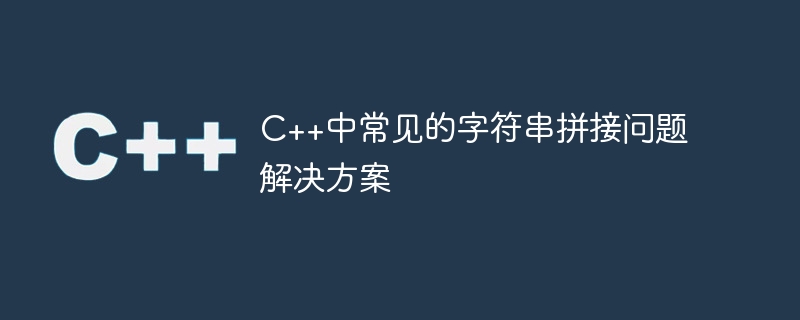Home >Backend Development >C++ >Solutions to common string concatenation problems in C++
Solutions to common string concatenation problems in C++
- 王林Original
- 2023-10-09 09:01:081357browse

Solutions to common string concatenation problems in C
In C programming, string concatenation is a common operation, especially when processing text and output results. This article will introduce some common string concatenation problems, provide corresponding solutions, and attach code examples to help readers understand.
-
Use the " " operator for string splicing
In C, you can use the " " operator for string splicing, for example:std::string str1 = "Hello"; std::string str2 = "World"; std::string result = str1 + " " + str2;
This This method is suitable for simple string concatenation, but may be less efficient for a large number of string concatenation operations. Because each splicing operation creates a new string object and copies the original string content.
-
Use std::stringstream for string splicing
std::stringstream is a class in the C standard library, which provides a convenient way to perform string splicing. Here is an example:#include <sstream> std::stringstream ss; ss << "Hello"; ss << " "; ss << "World"; std::string result = ss.str();
This method uses a std::stringstream object, appends different string fragments to the object by using the "
-
Use the append() method of std::string for string splicing
The std::string class provides an append() method for appending another string to the end of the original string. a string. The following is an example:std::string str1 = "Hello"; std::string str2 = "World"; str1.append(" "); str1.append(str2);This method operates directly on the original string object without creating a new temporary object, so it is more efficient.
-
Use the = operator of std::string for string concatenation
The std::string class also provides an = operator for appending another string to The end of the original string. Here is an example:std::string str1 = "Hello"; std::string str2 = "World"; str1 += " "; str1 += str2;
This method is similar to using the append() method, but it is more concise using the = operator.
-
Use string stream for string splicing
In addition to std::stringstream, the C standard library also provides the std::ostringstream class and std::ostringstream header file ( The sstream header file contains std::ostringstream). std::ostringstream is a subclass of std::stringstream and is used for string stream operations. Here is an example:#include <sstream> std::ostringstream oss; oss << "Hello"; oss << " "; oss << "World"; std::string result = oss.str();
This method is similar to using std::stringstream and can be used to append different string fragments to the string stream and eventually convert it to a std::string object .
Summary:
This article introduces common string splicing problems in C and provides corresponding solutions. Using the " " operator, std::stringstream class, std::string's append() method, std::string's = operator and string stream are all commonly used string splicing methods. Based on actual scenarios and needs, readers can choose the appropriate method to solve the string splicing problem.
The above is the detailed content of Solutions to common string concatenation problems in C++. For more information, please follow other related articles on the PHP Chinese website!

